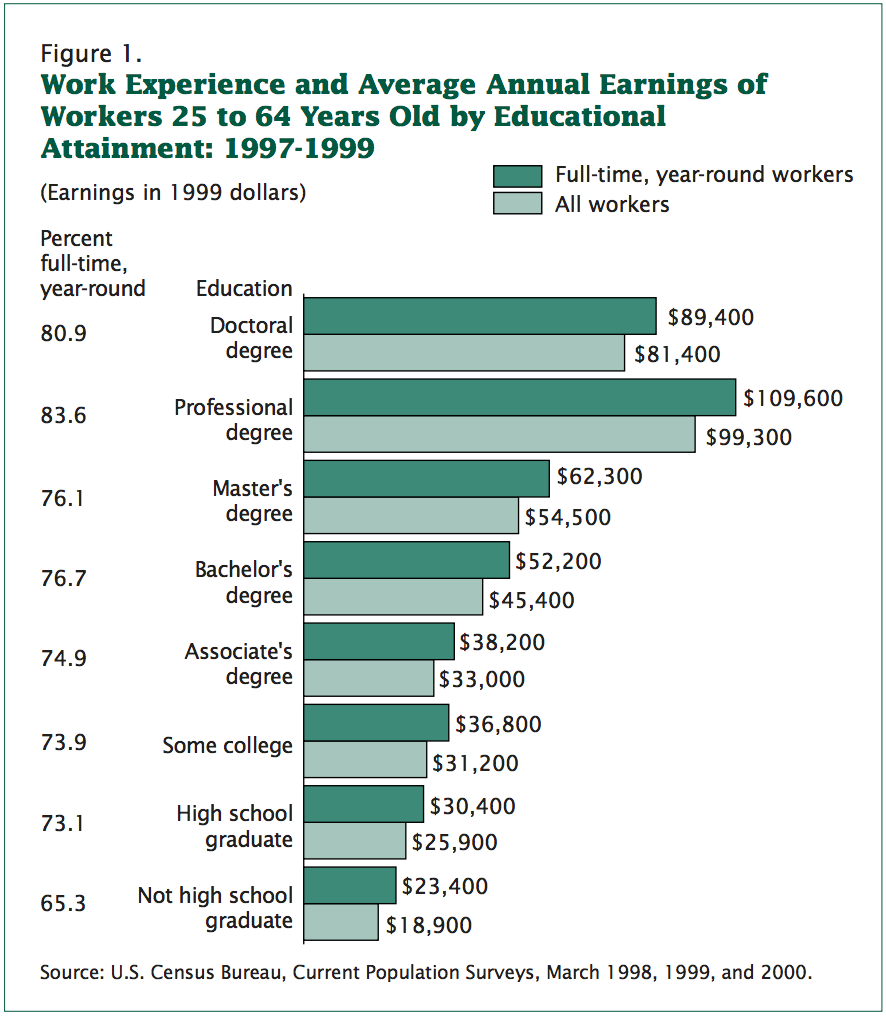Musings on College
The Bear
Two hunters are in the woods together, when they hear a massive roar coming from behind them. One of the hunters drops his pack and takes off running. The other follows, saying through labored breaths, “What are you doing, we’ll never outrun the bear.” The first hunter replies “I’m not trying to outrun the bear.”
 Photo Credit: Yathin S Krishnappa1
Photo Credit: Yathin S Krishnappa1
The bear, in this case, is either unemployment or a middling salary insufficient to offset an individual’s student debt. It can’t be outrun because the market forces behind it are an uncontrollable force of nature. It’s impossible to even say how many people have to be outrun because no one can predict how many people the bear is going to catch.
So people hear the roar and start running, and this means going to college. This is the advantage they need to stay ahead of enough people so that they can go out and build a life for themselves. College is going to give them the skills they need to not only succeed, but to excel in the workforce and therefore it is other people that will get eaten.
 “It’s time to start running” - Richard Dawson as Damon Killian in the Running Man2
“It’s time to start running” - Richard Dawson as Damon Killian in the Running Man2
But that’s not enough, and we know it’s not enough. We know this because of all the people who earned a college degree but still got eaten by the bear. While each individual person has his or her own story to tell, and his or her own share of the responsibility to assume, the majority of those people got eaten because they believed the following statement, which is demonstrably false: College is going to give you the skills you need to succeed or excel in the workforce.
The Lie
Believing this statement is reasonable, because enough people propagate the lie that it falls into the realm of “common knowledge” even though it is untrue. To understand how that happens, consider the following introduction to a 2002 report from the U.S. Census Bureau titled “The Big Payoff: Educational Attainment and Synthetic Estimates of Work-Life Earnings.”
 Click to view full size Click to view full size |
“Does going to school pay off? Most people think so. Currently almost 90 percent of young adults graduate from high school and about 60 percent of high school seniors continue on to college the following year. People decide to go to college for many reasons. One of the most compelling is the expectation of future economic success based on educational attainment.”3 |
Those responsible for this introduction showed extraordinary care in their word selection. They specifically avoid saying “A college degree results in greater earnings,” but they have crafted the message in such a way this is the conclusion people are most likely to reach. Take a minute and read it again with that in mind.
And of course people who work in media outlets and college marketing departments simply can’t stop themselves from condensing the information from that or similar reports into exactly that false conclusion. They read the report, they look at that hard data and they say “A college degree results in greater earnings.”
It may not be obvious to all exactly why that conclusion is problematic because by looking at the chart you can see that college graduates are pulling in bigger salaries. The issue turns out to be one of the most fundamental lessons from the field of statistics: “correlation does not imply causation.”

XKCD: Correlation by Randall Munroe4
Raw data can suggest a relationship but cannot imply the direction of the relationship or even establish clearly if there is a relationship all. To illustrate this, try to draw a conclusion from this next chart, which was produced using data from the same time period. (For more of these, check out Spurious Correlations.)
There is similar data showing that salaries of graduates from elite academic institutions are greater than the salaries of graduates from the other institutions. In 2002, some Harvard researchers examined that data and concluded (among other things) the following:
“We find that students who attended more selective colleges earned about the same as students of seemingly comparable ability who attended less selective schools”6
- Stacy Berg Dale and Alan B. Krueger
The Path Most Travelled
So being accepted to an elite school is, in many cases, just as good for a student’s financial expectation as actually attending it. Armed with that conclusion, consider an alternative interpretation of our earnings data. The higher earnings for college graduates, and the still higher earnings for graduates from elite institutions is a result of the admissions departments identifying those students with the greatest likelihood of financial success more so than any specific training or wisdom their corresponding institution imparts on the students.
100 years ago, college was accessible only to the privileged. The young of the rich were sent to elite institutions and upon graduation they took their expected positions in industry to lead the next generation. Notice how this progression highlights the importance of correlation versus causation regarding college graduation and financial success. Did those people lead their generation’s workforce because they went to college, or had they been anointed before attending?
Today is obviously a different story and with employment not assured solely by graduation, it seems prudent to examine that transition from student to worker and figure out what is going wrong for so many people.
There is a story often told in business schools about the early stages of McDonalds and Burger King, about how they each selected locations for new franchises. As legend had it, McDonalds would do all sorts of market and traffic analysis, taking any number of factors into consideration. They would compare and contrast and consider and ultimately determine the best location to erect a new store. Burger King had a different approach. They would wait for McDonalds to start construction on a new franchise and they would then move in next door.
In this legend, McDonald’s analysts are looking for causal relationships and Burger King’s are looking for correlations. Now, many larger employers behave like Burger King when it comes to hiring younger employees. They treat the colleges schools like McDonalds’, allowing them to scrutinize candidates on many levels and select the most promising ones. Those employers then step in, piggy-backing that selection process and giving little consideration to the alternatives.
Plenty of people are playing into this along the way, in particular students who focus too much on looking like a promising candidate rather than on actually being one. Don’t forget about the bear, because right around now, this should have some serious questions about what it means to run.
- What is the point of college in the first place?
- What makes graduates more attractive to employers?
- What is it that the college admissions offices are identifying?
- What are students supposed to do?
The Point of College
Colleges were developed as an alternative to trade schools or vocational programs. It was specifically created to be, and continues to be, not job training. This hasn’t changed over the years, but what has changed is how colleges are marketed to students, parents and employers. These marketing messages aren’t consistent with the messages coming from other functions of the college, notably the faculty and career guidance office.
This makes it difficult for many people to see the point of college. Today’s muddled message doesn’t really resonate with anyone. Previous generations had more clarity about college and used the term “educated man” (modernized to “educated person” presumably) to connote specific meaning regarding higher education.

“I’m an educated man, but I’m afraid I can’t speak intelligently about the travel habits of William Santiago.” - Jack Nicholson as Col. Nathan R. Jessup in A Few Good Men
The point of college is exactly this. To first understand what it means to be an educated person, and then to become that person.
“An educated man is one who can entertain a new idea, entertain another person and entertain himself.”7
- Sydney Wood
Why Employers Hire
An employer will typically hire a candidate for one of three reasons:
- The candidate has skills that are valued by the organization
- The candidate demonstrates raw abilities that will lead to the development of valuable skills
- The candidate is willing to do things that people who meet the first two criteria do not want to do

“Well, the world needs ditch diggers, too.” - Ted Knight as Judge Smails in Caddyshack
The first group, possessing valuable skills, has nothing to worry about. If they end up having something to worry about then they need to examine their application of the word “valuable.”

“You keep using that word, I do not think it means what you think it means” - Mandy Patinkin as Inigo Montoya in The Princess Bride.
The second group is where most college graduates envision themselves, and they usually plan to transition to the first group as quickly as possible. This is understandable because someone in that second group should be nervous about still being in that group when a new batch of “raw talent” graduates from college.
People in the third group are eaten by the bear.
Much of today’s transition from student to worker is based on internships, but the same causality trap that applies to college graduation also applies to internships. Merely having an internship is not what drives the statistical correlation with job offers after graduation. But what direction does the causal relationship even move in? Are people who will be successful more attracted to internships, or are some extracting specific value from the internship process. Or both?
Focusing too much on internships pushes college graduates into the first group. In doing so however, they are not often leveraging “college” benefits in those early positions. They accelerate their membership into the first group at the expense of their position in the second.
This should start to scare students. Graduation ceases to be the trigger to the opportunities that a college education brings. Now those opportunities are truly only available while you are an active student, and they actually cease when you graduate. You no longer have four years to put it all together.
And for the people that this scares, as the room starts to spin and they lose consciousness, they realize that how you run from the bear might not actually be the most important question. This is the point where they start to ask “When should I start running?” And, in asking that, they begin to realize that there were some people running before they heard the bear’s roar, and the question becomes “Is it already too late?”
It’s not too late, even if you’ve already been eaten.
 “So you’re telling me there’s a chance” - Jim Carrey as Lloyd Christmas in Dumb and Dumber
“So you’re telling me there’s a chance” - Jim Carrey as Lloyd Christmas in Dumb and Dumber
What Colleges Are Looking For
The college admissions process is designed to identify, in advance, those who will become the educated people that employers are willing to invest in and develop. These people that will become that second group in the workforce. They are trying to identify people with strong indicators towards these three abilities:
- Communication
- Achievement
- Leadership
These are important because regardless of what field you enter professionally, each one these abilities has a multiplicative effect on your professional skills. Now go back and look at the elements of the college admissions process. Taken at face value, it’s hard to see exactly how they apply to the workforce, but it’s rather easy to see how they can be used to evaluate those key abilities in a student.
- Your combined academic record, including standardized test scores
- Written Essays
- Extracurriculars
- An in-person interview (sometimes)
Looking at the admissions process as a cynical number-crunching exercise acknowledges only the correlation. The alternative is to use non-academic activities to develop the raw abilities that drive personal success, and the application is an opportunity to demonstrate that development. Performing extra-curricular activities or improving test scores so that your application looks like the application of a successful person is to chase the statistical correlations. Performing them to develop and demonstrate these key abilities is to focus on the causal relationships.
The students that chase the correlations are going to end up in the first group in their best case scenario. In the end, looking like a successful person is different from being a successful person, and the workplace usually will filter out these two groups one way or another.
The Three Groups
As with many other things in life, stasis is in the workforce is almost impossible to achieve. One’s professional status is either improving or declining. Your skills are either becoming more or less valuable. Even in a hypothetical situation where one’s skills maintain the exact same value over time, some improvement must be achieved to offset industry changes with respect to what constitutes value. No matter the field, workforce skills require constant maintenance.
Along with this realization comes the realization that to succeed in the workforce, an individual must take personal responsibility to maintain and improve these skills. It’s nice when an employer invests in one’s personal development, but there is no need to wait for this to happen. It follows that that same responsibility applies to the initial development of professional skills in the first place. This is the key to understanding the whole process. Professional skills development is most effective when an individual is personally committed to the pursuit.
The people that are the most successful in today’s workplace never leave the second group. That is not to say that they don’t develop valuable skills. They certainly do. In fact, they never stop. They just never reach the point where it is not worth additional investment. These people are in both the first and second groups at the same time for most or all of their careers. It’s possible to develop professional skills while still in college, and students would be foolish not to. It is more important, however, for students to demonstrate that they are worth investing in as a long term asset.
Many people, especially the people in the third category, comment on how they can’t get the opportunities they want because they lack experience, and the point out the conundrum “How am I supposed to get experience if someone won’t give me a job.” Every single person who says this is misunderstanding what experience is, and what it means to have it.
“Experience is what you get when you didn’t get what you wanted.”8
- Randy Pausch
“Good judgment comes from experience, and a lot of that comes from bad judgment.”9
- Will Rodgers or Jim Horning or Mulla Nasreddin or …
“Experience is something you don’t get until just after you need it.”
- Steven Wright
There are many pithy quotes regarding experience, but they all have the same common theme. One must do something in order to gain experience. It does not always matter what it is that they do.
“Experience” in this case isn’t solely related to professional experience, but rather all experience. The person being told this has neither skills nor promise in the opinion of the employer. They are not an educated person. They have not learned how to do anything of value to that employer and, presumably, there are no available positions where these shortcomings can be overlooked. This is one of the most important concepts to impart on the younger generation. The fact that being rejected for lack of experience is a euphemism and not to be taken literally. You are in the third group. You have been eaten by the bear.
How To Run From the Bear
There is a big difference between running from the bear and running from the bear efficiently. There is no one way to do it, and the best answer for an individual varies based on both the individual and the people that they are trying to outrun.
“If you know your enemies and know yourself, you will not be imperiled in a hundred battles… if you do not know your enemies nor yourself, you will be imperiled in every single battle.”10
- Sun Tzu
Self-awareness ends up being of critical importance in many aspects of life. It is effectively impossible to accumulate this knowledge without accumulating significant personal experience at the same time. A significant portion of knowing one’s self is knowing one’s personal limitations. No one should wait to be told what their limitations are for one simple reason. The person telling them could be wrong, but the assessment might stick.

“Freddy, what I am saying is: know your limitations. You are a moron.” - Michael Cain as Lawrence Jamieson in Dirty Rotten Scoundrels
Exploring personal limits as a student is important for two reasons. Firstly, people tend to get more conservative as they age, and it will be harder to find their true limits. Secondly, the only way to actually find personal limits is to pass them, and see what lies behind in the wreckage. This is an exhausting and destructive process, and is best done in a low-risk environment such as college.
![Waterson][calvion-and-hobbes] Calvin and Hobbes by Bill Waterson11
Surpassing limits is difficult for just about anyone to do, and is very difficult to do on one’s own. This is where leadership first comes into play. The greatest utility of a mentor, rival, advisor or coach is to help someone reach their full potential. People wanting to establish their limits need to find someone who is able and willing to lead them past their limits, and then commit themselves to the process.
“Leadership is getting someone to do what they don’t want to do, to achieve what they want to achieve.”12
- Tom Landry
Finding limits in valueless activities is not constructive, so people should strive to find their limits in such a manner that those activities result in achievement. Waiting to do something “until you are ready” is a dangerous delay tactic. The simplest way to be the thing you want is to remove the qualifiers. For example, don’t attempt to be a “national bestselling writer.” Just be a writer, even a bad one.
 “No. Try not. Do… or do not. There is no try.” - Frank Oz as Master Yoda in The Empire Strikes Back
“No. Try not. Do… or do not. There is no try.” - Frank Oz as Master Yoda in The Empire Strikes Back
The danger in wanting something versus doing it is that wanting focuses on the glory of the result whereas doing exposes the challenge. This exposure to challenge is the catalyst for true learning. A big reason that modern education has such limited effectiveness is that the students lack the context to apply the lessons. It is difficult to understand and appreciate solutions without understanding and appreciating the corresponding problems.
What you should do in college
For all intents and purposes, when a student agrees to go to a college, they commit to paying a significant sum for all four years. If they exercise the implied “escape clause” they are guaranteed to either pay much more, or get much less. When they agree to go, they agree to pay. They agree to pay for the whole experience even though many of them experience only a fraction of it. Students need to make a more deliberate effort to avail themselves to the opportunities that they have already paid for.

“Grab a brew. Don’t cost nothin’.” - John Belushi as John Blutarsky in Animal House
The abilities that the admissions offices are looking for are also the ones that students should focus on developing when they attend. Improvement in these areas is what colleges were built for. The opportunities available to students in the college environment should be considered not as activities but as opportunities to develop these core abilities.
- Communication
- Achievement
- Leadership
Consider the following three examples, understanding that there are countless others and that these three all have far more depth and nuance than will be presented here. One of the great thing about almost all activities available on a college campus is that a mix of ages and experience are represented within each group, exposing participants to mentors and rivals. There is also often an adult participant, typically an advisor or coach.
Participation in a performance group is a great way to develop communication skills, in particular the distinct skills associated with a single person addressing a group of strangers. There are also many opportunities for individual achievement and leadership, usually in the form of lead roles or solo performances. Singing, drama and comedy groups all fall into this category.
Involvement in sports can help a student to develop all of the key attributes. Sports can provide access to a mentors, rivals and coaches and is often the easiest way to test one’s personal limitations.
The greek system, if available, can also offer a student many of the growth opportunities that students are looking for. This is a riskier avenue though because there is such a large variance in the value of the experience and the quality of the opportunities.
Some might find it surprising that we have gotten this deep into an examination of education without mentioning academics. This topic was intentionally left until the end to illustrate the importance of these other topics, but it’s not that academics is unimportant or less important in the college education process. It is equally important, but the other elements that have been the target of discussion are the ones that are most often overlooked by today’s students.
Understand that your Grade Point Average will be discussed in initial interviews, because there is little else to discuss. The lower it is, the more time you will spend talking about it. Most screening interviews for college students are 30 minutes long. How many of those minutes can safely be spent discussing GPA without tanking the interview? Maintain a respectable GPA, and if you don’t find the material interesting enough to do so then either find new courses or pursue the subject matter on your own in order to better understand the problems that make the material interesting.
“Oh, so, you’re saying I should hire you because you don’t work very hard when the work is boring? Well, there’s boring stuff in programming, too. Every job has its boring moments. And I don’t want to hire people that only want to do the fun stuff.”14
- Joel Spolsky, founder Fog Creek Software
If you have room for improvement in your GPA, then treat that as an opportunity for personal achievement. Do not accept that you have limitations that cannot be surpassed. An academic grade is often a function of time committed and personal interest. Students who fail to increase both to sufficient levels on their own just need to find an advisor or mentor or rival who can help them do so.
“In a fixed mindset, people believe their basic qualities, like their intelligence or talent, are simply fixed traits. They spend their time documenting their intelligence or talent instead of developing them. They also believe that talent alone creates success—without effort. They’re wrong.”15
- Carol S. Dweck, author of Mindset
Finally, and most importantly, there are broad opportunities for academic projects outside of the classroom. These projects offer many of the same benefits as extra-curricular activities but with some fairly obvious academic benefits. These projects can help students find the context they need to better understand the lessons from the classroom. They can help students learn practical applications of their lessons in ways that an academic curriculum or internship cannot.
Please though, any student out there listening. Do something. Do anything. Just don’t waste your time in college.
-
Source: https://en.wikipedia.org/wiki/Bear#/media/File:2010-kodiak-bear-1.jpg ↩
-
Source: http://xkcd.com/552/ ↩
-
Source: http://www.nea.org/grants/35593.htm ↩
-
Source: http://www.cmgww.com/historic/rogers/about/miscellaneous.html ↩
-
Source: http://www.gocomics.com/calvinandhobbes/1986/11/26 ↩
-
Source: http://www.joelonsoftware.com/articles/CollegeAdvice.html ↩

